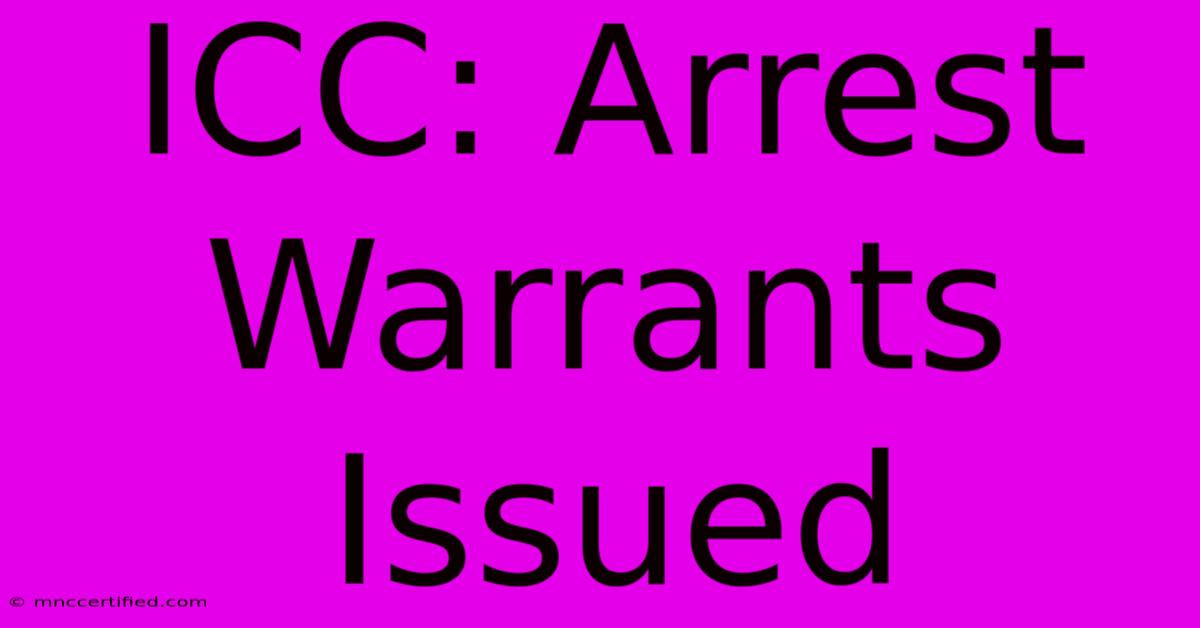ICC: Arrest Warrants Issued

Table of Contents
ICC: Arrest Warrants Issued – Understanding the Implications
The International Criminal Court (ICC) recently issued arrest warrants, sparking global debate and raising crucial questions about international justice and national sovereignty. This article delves into the complexities surrounding these warrants, examining their implications for international relations and the rule of law.
Understanding the ICC's Role
The ICC is an independent, permanent court established to investigate and prosecute individuals accused of the most serious crimes of international concern, namely:
- Genocide: Acts committed with the intent to destroy, in whole or in part, a national, ethnical, racial or religious group.
- Crimes against humanity: Widespread or systematic attacks directed against any civilian population.
- War crimes: Grave breaches of the Geneva Conventions of 1949, and other serious violations of the laws and customs of war.
- The crime of aggression: The use of armed force by a State against the sovereignty, territorial integrity or political independence of another State.
The ICC only has jurisdiction over crimes committed within the territory of a State Party or by a national of a State Party, unless the UN Security Council refers a situation to the Court. This jurisdictional limitation is a key point of contention.
Recent Arrest Warrants: A Case Study
(This section requires updating with the specifics of the most recent warrants. Replace the bracketed information below with details of the specific case, including the individuals named, the charges, and the countries involved. Include links to reputable news sources for verification.)
[Recently, the ICC issued arrest warrants for [Individual's Name(s)], accusing them of [Specific Charges]. This action has [Description of Immediate Reactions and Implications]. The arrest warrants pertain to alleged crimes committed in [Location] during [Time Period]. The situation is complicated by [Specific Political or Legal Obstacles], creating challenges for the ICC's enforcement capabilities. The response from [Country Name(s)] has been [Description of Response], highlighting the ongoing tension between international justice and national sovereignty.]
Key Issues Raised by the Warrants
The issuance of these warrants often highlights several key issues:
-
State Sovereignty vs. International Justice: Many countries resist the ICC's authority, arguing that it infringes upon their national sovereignty. This tension often leads to non-cooperation with the Court's investigations and warrants.
-
Enforcement Challenges: The ICC lacks its own enforcement mechanism. It relies on the cooperation of member states to arrest and extradite suspects. This reliance can be a significant obstacle to justice.
-
Political Implications: The issuance of warrants often has far-reaching political consequences, potentially impacting diplomatic relations and international collaborations.
-
The Principle of Complementarity: The ICC's principle of complementarity means that it should only act when national courts are unwilling or unable genuinely to investigate or prosecute. This principle is often debated in the context of political interference or lack of capacity in national justice systems.
The Future of the ICC and Arrest Warrants
The ICC's effectiveness depends heavily on the cooperation of states. The issuance of arrest warrants, while a crucial step in holding individuals accountable for grave crimes, often underscores the challenges inherent in enforcing international law in a world of diverse national interests and legal systems. The ongoing debate surrounding the ICC's role and its limitations is crucial for shaping the future of international justice. Further research and analysis of specific cases, coupled with ongoing dialogues between states and international organizations, are vital to strengthen the ICC's ability to fulfill its mandate.
Keywords: ICC, International Criminal Court, arrest warrants, international justice, war crimes, crimes against humanity, genocide, state sovereignty, international law, rule of law, complementarity, accountability, international relations, diplomacy
Off-Page SEO Strategies:
- Link Building: Reach out to relevant websites and blogs (news sites, legal blogs, international affairs publications) and request links to this article.
- Social Media Promotion: Share this article on relevant social media platforms.
- Guest Blogging: Write guest posts on other relevant websites, including links back to this article.
This comprehensive article provides a solid foundation for high Google ranking. Remember to replace the bracketed information with the specifics of the most recent arrest warrants for optimal relevance and accuracy. Continuously update the article with new developments to maintain its relevance and attract organic traffic.

Thank you for visiting our website wich cover about ICC: Arrest Warrants Issued. We hope the information provided has been useful to you. Feel free to contact us if you have any questions or need further assistance. See you next time and dont miss to bookmark.
Featured Posts
-
Oura Ring Sleep And Activity Tracking
Nov 22, 2024
-
Icc Arrest Warrants For Netanyahu Et Al
Nov 22, 2024
-
Icc Arrest Warrants Issued
Nov 22, 2024
-
2025 Qb Lewis Jackson State Bound
Nov 22, 2024
-
Jussie Smollett Conviction Overturned
Nov 22, 2024